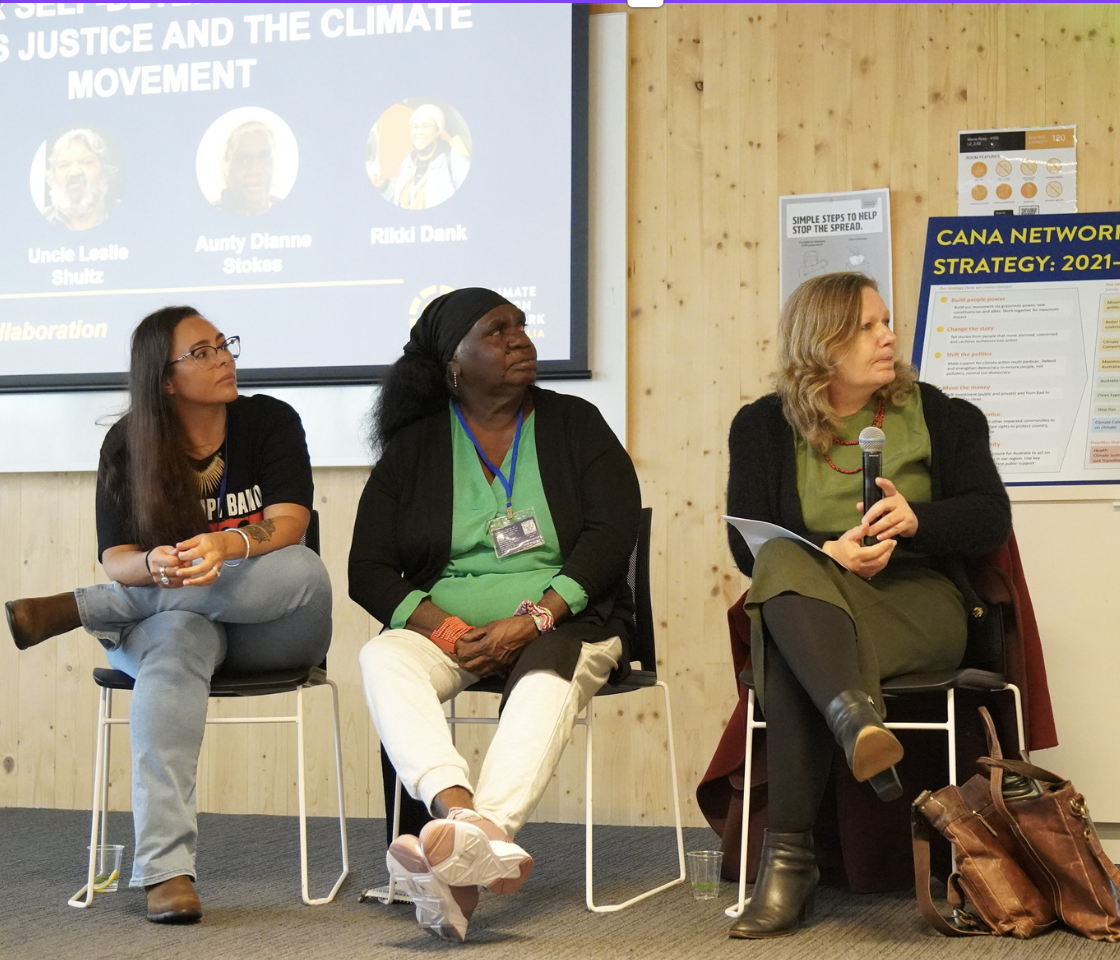CANA acknowledges we work on unceded Aboriginal and Torres Strait Islander lands and waters and we pay our deep respect to all First Nations people - in particular their elders past and present.
Aboriginal and Torres Strait Islander people have cared for this Country since time immemorial with languages, cultures, and living histories deeply connected to the lands and waters of this continent. Climate change in so-called Australia is deeply linked to the destruction caused by colonisation and ongoing colonial dispossession. Aboriginal and Torres Strait Islander peoples, like First Nations communities around the world, are at the forefront of both experiencing the effects of climate change and also in leading climate action. We acknowledge the important role Aboriginal and Torres Strait Islander people play in the climate movement. This always was, and always will be, First Nations land.
Aboriginal and Torres Strait Islander Solidarity Commitments
L: Rikki Dank; M: ; R: Cathy Oke
Photo credit: Hasmukh Chand - CANA
These commitments have been formed from the bottom up, initiated and guided through discussions between Climate Action Network Australia members and Aboriginal and Torres Strait Islander peoples. We especially appreciate guidance from Amelia Telford, Lidia Thorpe, Brooke Prentis and Aimee Mehan. Previous versions of this document have been shared with all CANA member groups and more than 30 groups contributed to the development of these commitments.
Our network commits to strengthening relationships, engaging and working respectfully with Aboriginal and Torres Strait Islander peoples to uphold climate justice.
This process is part of a journey towards genuine relationships of solidarity that require transformative organisational and personal change. This is the responsibility of non-Indigenous Australians who live on stolen land and benefit from the dispossession of lands and waters from their traditional owners. We have a responsibility for decolonisation and remedying the harms of the past including systemic racism, injustice and discrimination. We need to do this work both as individuals and in all dimensions of our organisations.
This process, and the actions identified below need to be accompanied by deep and genuine relationships that endure beyond specific campaigns. Solidarity must be core business. We all stand on the shoulders of the leadership of many Aboriginal and Torres Strait Islander leaders and campaigners including those within the climate movement. As Brooke Prentis points out, “Aboriginal peoples have been fighting for a safe climate for all for over 250 years.”
CANA members may demonstrate their solidarity in many ways, beyond the commitments outlined here, with action plans that reflect their unique relationships and circumstances. Many member groups have detailed action plans. For other organisations, these commitments will require further resources, and be implemented over time. Implementing these actions across the network will require larger, better resourced climate groups to share resources with and support smaller groups. We commit to continuing and deepening our work of solidarity with Indigenous communities and to addressing the impacts of colonisation. We learn by doing. This process and these commitments will evolve and strengthen through action.
Principles for working with Aboriginal and Torres Strait Islander peoples
We recognise that relationship with Aboriginal and Torres Strait Islander peoples is core business. Aboriginal and Torres Strait Islander peoples’ campaigns, rights and interests don’t silo climate and nature issues.
United Nations Declaration on the Rights of Indigenous Peoples: We will be guided by, uphold, and not contravene the United Nations Declaration on the Rights of Indigenous Peoples.
Nothing about us without us: We will apply the principles of Free, Prior and Informed Consent (FPIC) to any campaign planning decision affecting the protection or management of Country or its natural values and resources.
Principles of respectful engagement: We will respectfully engage with all Aboriginal and Torres Strait Islander peoples. When engaging on specific country or Aboriginal nation or specific island in the Torres Strait, we will establish relationships with those with cultural authority and community authority such as Traditional Owners, Elders, and Leaders. In some areas there may be more than one Traditional Owner group, Elder or Leader. It is recommended that principles of respectful engagement are complemented by specific principles of engagement in a Memorandum of Understanding or another guiding mutual agreement4 and agreed upon with those with cultural authority and community authority. There will be times when climate groups and Aboriginal and Torres Strait Islander peoples will have different and potentially contrary priorities and perspectives. In these situations, we will maintain respectful relationships.
Appropriate compensation for work: we will remunerate and recognise Aboriginal and Torres Strait Islander peoples who have provided services, knowledge, expertise and/or time.
Sovereign Hub
Sovereign Spaces: We will consider establishing or supporting Sovereign Spaces. This could
include support for the establishment of campaign hubs in our state, region or major city to
provide the space for Aboriginal and Torres Strait Islander peoples working for climate justice
and Aboriginal and Torres Strait Islander-led organisations and campaigns to work in a self-determined way, providing the opportunity to connect with the climate/ environment
movement, to mutually learn, skill-share and grow solidarity.
Resourcing
We will give at least 1% of annual income to campaigns led by Aboriginal and Torres Strait Islander organisations and peoples. This is recognition of stolen land and Indigenous sovereignty. This can be through establishment of a Sovereign Space, through mechanisms such as ‘pay the rent’ and Voice, Treaty, Truth, directly giving to organisations and campaigns, or to Traditional Owners and Traditional Owner groups.
Reforming our Organisations
Aboriginal and Torres Strait Islander staff and board members: We will employ Aboriginal and Torres Strait Islander peoples. We will elect or appoint Aboriginal and Torres Strait Islander peoples as Board members, and give consideration to expense reimbursement and remuneration even if a volunteer board. We will ensure appropriate support for employees, cultural safety within our organisations (see 4d below), and be mindful to avoid tokenism (e.g. a single person).
Allocated budget: We will dedicate budget line to ensure our own engagement and solidarity with Aboriginal and Torres strait Islander peoples and organisations and their campaigns.
Commit funding for internal training: We will ensure staff, Board members, volunteers and other people active in our organisation receive cultural awareness training and anti-racism training led by Aboriginal and Torres Strait Islander groups and organisations, where possible with cultural authority for the nations on whose land we are working.
Make our organisation (physical and virtual) culturally safe: Cultural safety means creating environments where people feel safe – where there’s no challenge to their identity, and where their needs can be met. Assessments about how culturally safe an organisation is, should be made by one or more Aboriginal and Torres Strait Islander peoples. Cultural safety must be embedded in our policies and practices. One way to maintain momentum and accountability around cultural safety in our organisations is to convene a working group or committee with staff and board representation.
Lead by example in the climate movement: The 140 community groups in CANA are just part of the climate movement. We will share our commitments and what we learn about working in solidarity with the broader climate movement to encourage a deepening of solidarity.
CANA Network Support Team commitments and actions:
CANA CEO and Leaders meetings will incorporate candid discussion on progress with these actions as a standing agenda item. Agendas will allocate time to seeking input and advice from Aboriginal and Torres Strait Islander CEOs, ensuring an Indigenous assessment of our progress in implementing these commitments.
CANA’s Network Support Team will coordinate 4 forums each year such as “Brown Bag Lunches” for Aboriginal and Torres Strait Islander peoples in the CANA network to lead topics and discussions of their choice.
CANA’s Network Support Team will also coordinate forums such as “Brown Bag Lunches” to showcase progress made by member organisations to implement these commitments and facilitate networking opportunities.
CANA can advise the sector of available training in cultural awareness, anti-racism and decolonisation. Our network will work to ensure training is available to members regardless of size, budget and geography.
To ensure we learn from our actions, these commitments will be a standing item in the agenda of CANA Leaders meetings.
These discussions will include:
Ongoing dialogue between CANA members and Aboriginal and Torres Strait Islander peoples and organisations about these commitments and how we implement them.
The proposal to establish a CANA working group to support members as we honour and implement these commitments and to further strengthen the commitments.
Creating sovereign hubs in Sydney and Brisbane and sharing infrastructure with Aboriginal and Torres Strait Islander campaigners beyond capital cities.
Sharing resources between CANA members.
Developing a strengthened and shared understanding about Free, Prior and Informed Consent and the UN Declaration on the Rights of Indigenous Peoples; what these mean in practice (e.g. through training)
Many CANA members have endorsed the Statement from the Heart, Change the Date, Black Lives Matter and other campaigns. Involvement in these should be made in consultation with Aboriginal and Torres Strait Islander peoples and organisations with whom members have relationships.

